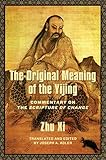The original meaning of the Yijing : commentary on the scripture of change / Zhu Xi ; translated and edited by Joseph A. Adler.
Material type: TextLanguage: English Original language: Chinese Series: Translations from the Asian classicsPublisher: New York : Columbia University Press, [2020]Description: 1 online resource (viii, 387 pages)Content type:
TextLanguage: English Original language: Chinese Series: Translations from the Asian classicsPublisher: New York : Columbia University Press, [2020]Description: 1 online resource (viii, 387 pages)Content type: - 023154930X
- 9780231549301
- Zhou yi ben yi. English
- 299.5/1282 23
- PL2464.Z6 Z5814613 2020
- online - EBSCO
| Item type | Current library | Call number | URL | Status | Notes | Barcode | |
|---|---|---|---|---|---|---|---|
 eBook
eBook
|
Biblioteca "Angelicum" Pont. Univ. S.Tommaso d'Aquino Nuvola online | online - EBSCO (Browse shelf(Opens below)) | Online access | Not for loan (Accesso limitato) | Accesso per gli utenti autorizzati / Access for authorized users | (ebsco)2088035 |
Browsing Biblioteca "Angelicum" Pont. Univ. S.Tommaso d'Aquino shelves, Shelving location: Nuvola online Close shelf browser (Hides shelf browser)
"This complements our The Classic of Changes: A New Translation of the I Ching as Interpreted by Wang Bi (1994). Wang Bi's commentary was the most influential interpretation from the 3rd century to the late twelfth, when it was supplanted by those of Cheng Yi and Zhu Xi, the chief figures of the dominant school of Confucianism for the past eight centuries. A major revival of Confucian thought and practice had begun a century before Zhu Xi's time, incorporating some elements from Daoism and Buddhism. Zhu Xi wove together a selection of concepts and practices from this new movement with Classical Confucian teachings to create what is generally known as Neo-Confucianism. This was the dominant school of traditional Chinese thought into the 20th century, and is still the subject of much scholarly interest worldwide"-- Provided by publisher
Translation of: Zhou yi ben yi.
Includes bibliographical references and index.
Introduction: the original meaning of the Zhou changes (Zhouyi Benyi) / Zhu Xi Part A: Hexagrams 1-30 -- Part B: Hexagrams 31-64 -- Treatise on the appended remarks / Xici Zhuan -- Treatise discussing the trigrams / Shuogua Zhuan -- Commentary on assorted hexagrams / Zagua Zhuan -- Appendix: Divination ritual.
Online resource; title from digital title page (viewed on November 20, 2019).









